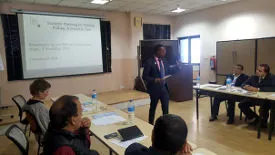
After almost a decade-long process of political bickering and multi-stakeholder dialogues, Nepal adopted a new constitution on 20 September. The constitution provides for a federal system of government, as opposed to the previous unitary state system. Nepal is now a federation that will be comprised of seven states, each with a legislature and chief minister.
Among other democratic institutions that now have to align their organizational mindset and processes to this new political reality, are political parties. In the long run federalism is likely to bring about biggest changes to Nepal’s political party system since 1990 when multiparty democracy was introduced. For example parties will now have to adjust their internal organizational structures to reflect the federal nature of the political system by opening new state branches or offices.
This shift also has financial and human implications that political parties need to seriously discuss internally and strategize for. New internal procedures such as nomination processes to respond to the changes in the electoral system, specifically at the province and local levels, will be essential to how well the parties do in the future.
The new constitution explicitly states that political parties must be internally democratic and requires them to hold internal elections at least once every five years. This is just one of several legal obligations political parties must now adapt to and have clear internal guidelines on how to comply with. The same applies for other inevitable legal reforms, such as the reform of the political parties’ law and electoral law that are forthcoming.
It is against this background that International IDEA on 2 November presented the Strategic Planning Tool for Political Parties to the ECN, the body responsible for registering and overseeing the activities of political parties in Nepal. The meeting took place at the ECN offices in Kathmandu, and was attended by 25 senior officials including Secretary of the ECN Sharada Prasad Trital and Joint-Secretary Surya Prasad Sharma as well as under-secretaries and other officials of the commission.
The objective of the meeting was to discuss the content and methodology of the tool, share experiences of where it has been implemented so far, and to brainstorm whether it would be relevant and add value to Nepal’s political parties. The ECN indicated that this presentation of the tool was timely given the new political developments in Nepal and that it would be very happy to partner with IDEA to implement it with political parties.
The ECN will now undertake internal consultations as well as consult with political parties about best format and timing for parties’ strategic planning process.
The IDEA team also met with nine representatives of the major political parties and held similar discussions as with the ECN. The party representatives also expressed support for tool, highlighting that the strategic planning methodology that the tool offers, which involves comprehensive internal consultations and also focuses on equitable gender representation, is in itself a positive novelty that parties in Nepal need and should embrace.
Politicians also indicated that the process is itself a positive development compared to the way decision-making has taken place within parties in the past. Like the ECN, political party representatives suggested that they go back and do a thorough check of the strategic implications of the new constitution as well as allow time for current political debate on a few remaining contentious issues on the constitution to be concluded before embarking on the planning process.



